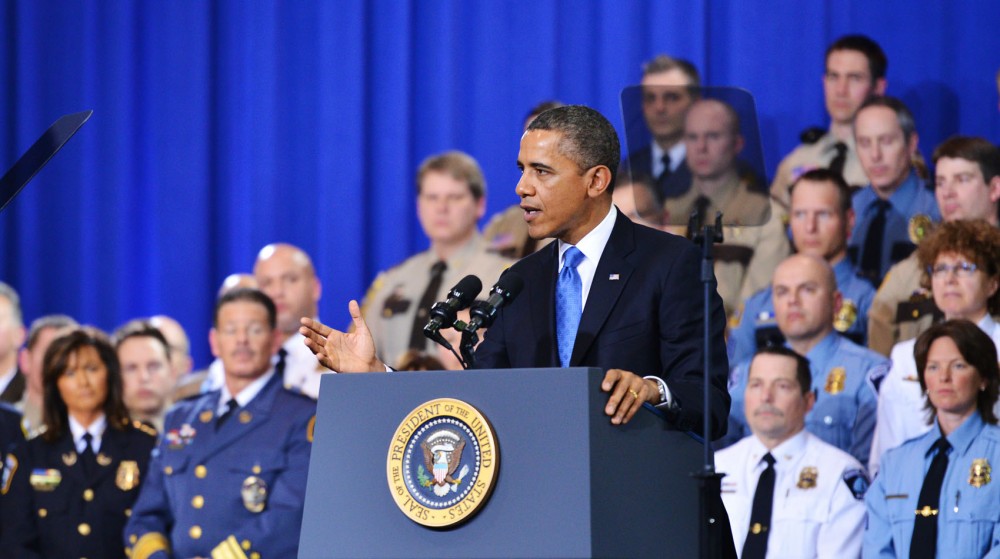Amid a debate over a term-defining issue, President Barack Obama made a brief trip to Minneapolis to meet with law enforcement and elected officials Monday to push for tighter gun laws.
Speaking from the Minneapolis Police Department Special Operations Center in North Minneapolis, Obama laid out his “common sense” proposals for stricter gun control in the context of recent mass shootings.
“We don’t have to agree on everything to agree that it’s time to do something. That’s my main message here today,” Obama said.
The president called on Congress to “do its part, and do it soon” in changing gun laws, including placing bans on assault weapons and implementing universal background checks for gun sales, something he said wasn’t “a liberal idea or a conservative idea” but a “smart idea.”
On his way out to speak, Obama shook hands with many representatives from state and local law enforcement, whose seats formed the backdrop of the president’s speech.
“If we’re serious about preventing” tragedies like the Newtown, Conn., school shooting and other shootings that occur every day, “then law enforcement and other community leaders must have a seat at the table,” Obama said.
“They know what works, they know what doesn’t work and they know how to get things done without regard to politics.”
Obama promoted the broader parts of his gun proposals, including more mental health resources and more cops. He also stressed the importance of keeping assault weapons out of the hands of civilians.
“Weapons of war have no place on our streets or in our schools or threatening our law enforcement officers,” he said. “Our law enforcement officers should never be outgunned on the streets.”
Marsha Mayes, whose 3-year-old son Terrell Mayes Jr. was killed in December 2011 by a stray bullet a few blocks away from the center, was in attendance and said she supports Obama’s plan.
“I am interested in [Obama’s] gun control policies. I feel it does need to happen,” she said. “If everybody has to go through a background check, hopefully they start finding these thugs on the street.”
U repped at roundtable
Before his public remarks, Obama held a private roundtable discussion on gun violence with Gov. Mark Dayton, Minneapolis Mayor R.T. Rybak, U.S. Attorney General Eric Holder and members of Minnesota’s congressional delegation, as well as local community leaders.
University of Minnesota police Chief Greg Hestness was also in on the roundtable discussion representing University police.
One of the primary topics of discussion at the roundtable was mental health and its relation to gun violence, Hestness said. He added that mental health is a topic he feels very passionate about, and he appreciated the opportunity to speak at the meeting.
“The opportunity to speak your mind and listen to the president directly is pretty rare,” he said. “He spoke some, but he listened mostly.”
Hestness talked about the University’s commitment to mental health and how challenging it can be to monitor behavior in a large student body.
“A lot of people say, how could people have missed the behaviors of [Seung-Hui Cho] at Virginia Tech, and the University of Minnesota is twice the size of Virginia Tech,” he said. “So we work pretty hard to not miss those things.”
Why Minneapolis?
The White House picked Minneapolis as the backdrop for Obama’s remarks in part because of recent steps the city has taken to tackle gun violence, including a push for stricter background checks.
Violent crime in Minneapolis peaked in the ’90s and decreased relatively slower than in other U.S. cities.
In Minneapolis, 80 residents ages 15 to 24 died by homicide from 2003-06, making it the leading cause of death for the group. Since then, the city has passed several initiatives aimed at decreasing violence among youth and in certain neighborhoods.
The center where Obama spoke is located in the Fourth Police Precinct, where police seized an average of a gun a day last year, according to a Star Tribune article. It is also located a few blocks from where 5-year-old Nizzel George was shot and killed in his house during a gang dispute.
Last week, Minneapolis police Chief Janeé Harteau, who introduced Obama on Monday, and Hennepin County Sheriff Rich Stanek visited the White House to discuss gun control. They met with Obama, Vice President Joe Biden and Holder, among others.
Stanek, a strong supporter of the Second Amendment, was also present for the roundtable discussion Monday. He expressed concern about the effect that gun control can have on reducing violence and instead emphasized the need for improvements in the background- check system.
“Gun ownership isn’t a privilege, it’s a right guaranteed by the Constitution,” he said. “We have an access problem; people already prohibited by law from owning or buying a gun should never have access to firearms. We shouldn’t impose on the rights of law-abiding citizens to try to solve this problem. Gun control alone will not solve the complex problem of guns and extreme violence.”
At the Capitol
Obama’s visit marks the beginning of a week of similar gun-related conversations at the Minnesota state Legislature. This week, state lawmakers are slated to address a number of gun regulatory bills, including one introduced late last week by Rep. Alice Hausman, DFL-St. Paul, which would ban assault weapons and excessive ammunition clips.
Legislators will also discuss a bill penned by Sen. Bobby Joe Champion, DFL-Minneapolis, requiring universal background checks for all pistol and assault weapon purchases in the state.
Rep. Tony Cornish, R-Vernon Center, has conversely proposed loosening campus gun laws and allowing students and faculty members to conceal and carry handguns. Cornish hasn’t formally proposed a bill but has said it’d be unlikely to pass.
—The Associated Press and Minnesota Daily reporter Jake Stark contributed to this report.








